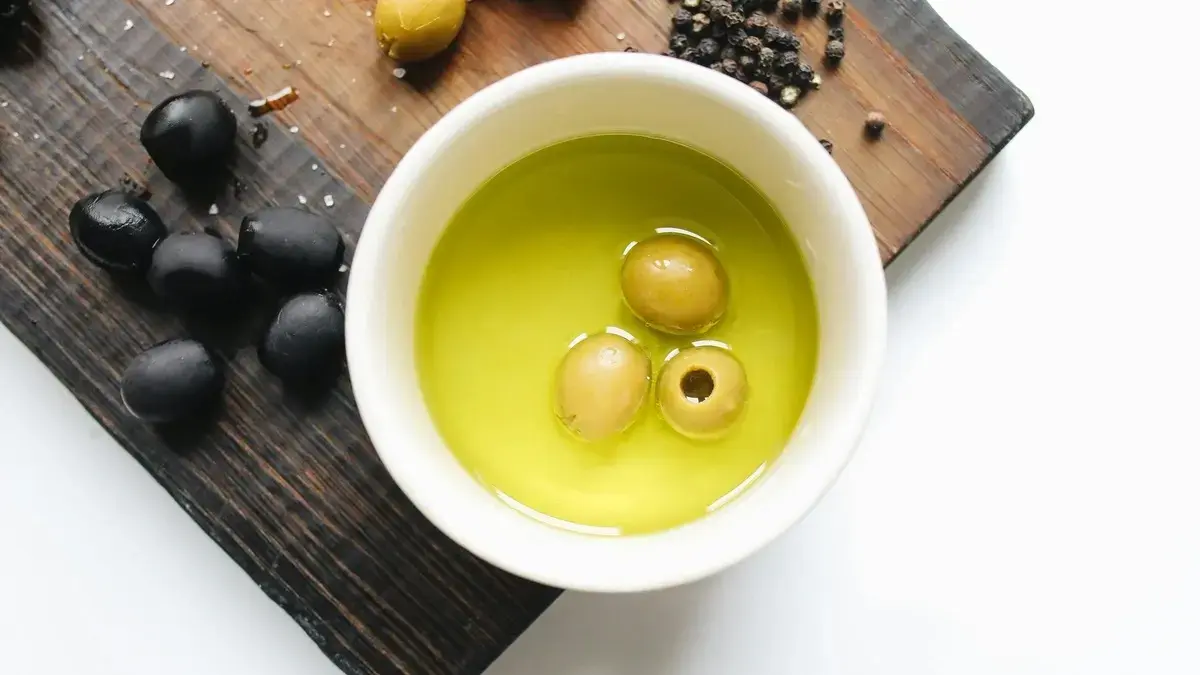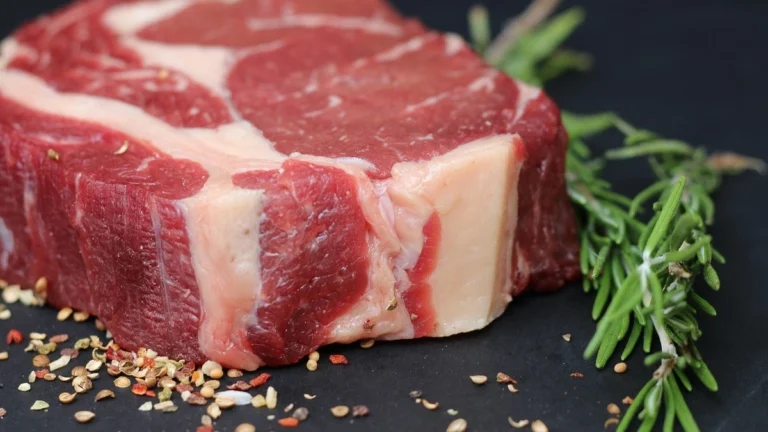ABOUT OLIVE OIL
Olive oil is a nutrient-rich oil extracted from the fruit of Olea europaea commonly known as the olive tree using mechanical cold-pressing methods. As a liquid fat and a key component of the Mediterranean diet, olive oil has earned global recognition for its numerous health benefits.
To understand why it’s so beneficial, let’s first explore its impressive nutritional profile.
NUTRITIONAL PROFILE OF OLIVE OIL
This historic and versatile oil is rich in bioactive compounds, including polyphenols, antioxidant vitamins A, D, E, and K, oleocanthal, squalene, monounsaturated fats especially oleic acid and polyunsaturated fatty acids.
Thanks to this unique mix of healthy fats and antioxidants, olive oil acts as a natural shield against inflammation and oxidative stress, setting the stage for many of its health benefits.
HEART HEALTH BENEFITS: A NATURAL SUPERFOOD
Building on its nutrient power, olive oil stands out for protecting the heart. Olives are packed with heart-healthy fats, particularly monounsaturated fats, with oleic acid making up about 70% of olive oil. This key component plays a crucial role in supporting cardiovascular wellness. In addition, olive oil contains polyunsaturated fatty acids like omega-3 and omega-6, along with potent antioxidants such as vitamin E and polyphenols, making it a top choice for anyone seeking to improve heart health naturally.
Regular consumption of olive oil helps maintain a healthy lipid profile by lowering LDL (“bad”) cholesterol and raising HDL (“good”) cholesterol. This balance significantly reduces the risk of heart disease and stroke.
In fact, a 2022 study published in BMC Medicine revealed that for every 10 grams per day increase in extra-virgin olive oil intake, there was a 10% reduction in cardiovascular disease risk and a 7% decrease in overall mortality.
Beyond cholesterol management, olive oil also reduces inflammation and oxidative stress two major contributors to cardiovascular disorders.
According to 2023 research in Biomolecules, extra-virgin olive oil improves arterial and myocardial health, helps regulate blood pressure, and further boosts lipid balance by lowering LDL and increasing HDL levels.
With the heart protected, let’s look at how olive oil also soothes inflammation throughout the body.
THE NATURAL POWER OF OLIVES: A MILD ALTERNATIVE TO IBUPROFEN
Olives contain a powerful natural compound called oleocanthal, which has significant anti-inflammatory effects.
Researchers have discovered that oleocanthal works in a way that closely mimics ibuprofen, a common over-the-counter pain reliever. It does so by blocking cyclooxygenase enzymes (COX-1 and COX-2) the same enzymes targeted by NSAIDs to reduce the production of prostaglandins, chemicals that trigger pain, inflammation, and swelling.
This anti-inflammatory action provides a smooth bridge to olive oil’s role in weight management, where reducing chronic inflammation can make healthy metabolism easier.
HOW OLIVE OIL CAN HELP WITH WEIGHT MANAGEMENT
Olive oil isn’t just a flavorful addition to meals it can actually support healthy weight management. Even though it’s calorie-dense (about 135 calories per tablespoon), it’s packed with heart-healthy fats especially oleic acid, a monounsaturated fat known to boost metabolism, increase satiety, and balance energy levels.
Several studies have shown that olive oil may help reduce body weight, body mass index (BMI), and waist size.
A major review also found that people who follow a Mediterranean-style diet rich in olive oil tend to have a lower risk of obesity and better overall health.
Of course, moderation is key. Using olive oil as part of a balanced diet not pouring it over everything helps you enjoy its benefits without extra calories.
From weight management, we move naturally to another internal benefit: protecting the gut.
HOW OLIVE OIL FIGHTS HARMFUL BACTERIA AND SUPPORTS GUT HEALTH
Olive oil does more than enhance flavor it’s also packed with natural compounds that support the gut and fight harmful bacteria.
Its polyphenols, including oleuropein, hydroxytyrosol, tyrosol, oleacein, and oleocanthal, inhibit the growth of harmful bacteria such as Staphylococcus aureus, Streptococcus mutans, Escherichia coli, and Helicobacter pylori by damaging their cell membranes.
What makes this even more remarkable is that while olive oil fights off bad bacteria, it also nourishes beneficial gut microbes, creating a healthier microbiome and stronger immune system.
A healthier gut sets the foundation for disease prevention, including certain cancers.
OLIVE OIL’S ANTICANCER BENEFITS
Olive oil may help protect the body against various types of cancer, including breast, gastrointestinal, respiratory tract, and urinary tract cancers. This is mainly due to oleocanthal, which can selectively destroy cancer cells by breaking down their lysosomes without harming healthy cells.
The same antioxidant and anti-inflammatory compounds that defend against cancer also appear to protect the brain.
OLIVE OIL AND BRAIN HEALTH: REDUCING ALZHEIMER’S RISK
Oleuropein aglycone, a phenolic compound found in extra virgin olive oil, shows promising neuroprotective effects.
Research suggests it may help prevent key pathological hallmarks of Alzheimer’s disease by inhibiting amyloid-beta plaque formation, reducing neuroinflammation, and combating oxidative stress.
The Mediterranean diet, which prominently features olive oil, has been consistently linked to a lower risk of developing Alzheimer’s disease.
A recent Harvard study found that consuming just half a tablespoon of olive oil daily was associated with a 28% reduced risk of dementia-related death.
And the benefits don’t stop at internal health olive oil also works wonders on the outside.
BENEFITS FOR SKIN HEALTH: HYDRATION, HEALING, AND ANTI-AGING
Thanks to vitamin E and squalene, olive oil helps lock in skin moisture, keeping it hydrated and supple. Its antioxidant properties combat free radicals, reduce inflammation, and minimize oxidative stress, helping to prevent premature aging.
Studies also suggest that olive oil supports wound healing and may aid in treating chronic wounds such as diabetic foot ulcers.
However, excessive use may clog pores in oily or acne-prone skin, so moderation is important.
For those who enjoy self-care, olive oil even doubles as a soothing massage oil.
OLIVE OIL FOR MASSAGE
When used as a massage oil, olive oil can boost relaxation, reduce muscle tension, and improve circulation yet another way this versatile oil supports whole-body wellness.
CONCLUSION
Extra virgin olive oil is far more than a kitchen staple. Packed with heart-healthy fats, antioxidants, and anti-inflammatory compounds like oleocanthal, it supports heart health, brain function, skin care, and more.
Whether drizzled over salads, blended into dips, or used as a gentle skin moisturizer, olive oil earns its place as a daily ally for lifelong wellness.
FREQUENTLY ASKED QUESTIONS (FAQs)
1. How much olive oil should I consume daily for health benefits?
Most research suggests about 1–2 tablespoons (15–30 mL) of extra-virgin olive oil per day as part of a balanced diet provides heart and brain benefits.
2. Is extra-virgin olive oil better than regular olive oil?
Yes. Extra-virgin olive oil (EVOO) is mechanically cold-pressed, which preserves polyphenols and antioxidants that give it superior anti-inflammatory and heart-protective effects.
3. Can I cook with olive oil without destroying its nutrients?
Light sautéing or baking at moderate temperatures is safe. EVOO has a smoke point around 375°F (190°C), making it suitable for most everyday cooking. Prolonged high heat may reduce some antioxidants.
4. Will olive oil help me lose weight?
Olive oil is calorie-dense, but studies show that when used in moderation and as part of a Mediterranean-style diet, it can support healthy weight management by promoting satiety and balanced metabolism.
5. Is olive oil safe for skin application?
Generally, yes, especially for dry skin. However, people with oily or acne-prone skin should test a small area first to avoid clogged pores.
DISCLAIMER
This article is for educational purposes only and is not a substitute for professional medical advice, diagnosis, or treatment.
Always consult a qualified healthcare provider before making significant dietary or skincare changes, especially if you have chronic conditions, allergies, or are taking prescription medications.
CALL-TO-ACTION
Ready to make olive oil part of your wellness routine?
• Try drizzling extra-virgin olive oil over salads, roasted vegetables, or whole-grain bread instead of butter.
• Share this article to inspire friends and family to embrace the heart-healthy Mediterranean lifestyle.
• For more science-backed nutrition tips, subscribe to my newsletter or follow my LinkedIn page for weekly updates.
Read more: https://pharmahealths.com/estrogen-menopause-heart-health-foods/
REFERENCES
1. Guasch-Ferré M, et al. BMC Medicine. 2022 – Olive oil intake and cardiovascular disease risk.
2. Schwingshackl L, et al. Biomolecules. 2023 – Extra-virgin olive oil and lipid profile improvements.
3. Harvard T.H. Chan School of Public Health. 2023 – Olive oil consumption and reduced dementia-related mortality.







